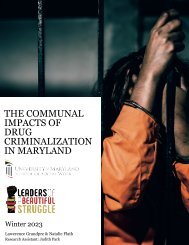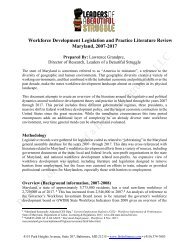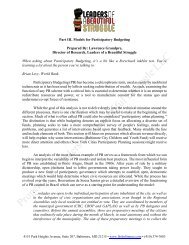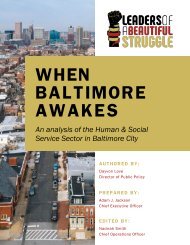Drug Decriminalization in Maryland Through an African Centered Research Paradigm- Analysis and Recommendations
This document offers guidance for theorizing questions related to a proposed research project purposed to advance drug decriminalization in Maryland.
This document offers guidance for theorizing questions related to a proposed research project purposed to advance drug decriminalization in Maryland.
- No tags were found...
Create successful ePaper yourself
Turn your PDF publications into a flip-book with our unique Google optimized e-Paper software.
While it is seductive to chalk these epistemic limitations up to pure hum<strong>an</strong> nature, research<br />
shows the history of how these ideas of “scientific objectivity” <strong>an</strong>d “universalism” mirror the<br />
history of western imperial control. Former Hunter College professor Marimba Ani uses the<br />
philosophy of John Stewart Mill to make a more signific<strong>an</strong>t po<strong>in</strong>t around the very concept of<br />
“social science” as <strong>an</strong> attempt to br<strong>in</strong>g the scientific method to the social world as <strong>in</strong>herently <strong>an</strong><br />
act of control <strong>an</strong>d <strong>an</strong> effort to leverage science as a tool of power. Ani writes:<br />
“Formidable m<strong>in</strong>ds were committed to the task of impart<strong>in</strong>g “objectivity" <strong>an</strong>d<br />
“universality” to Western social science… For Mill the <strong>in</strong>ability to predict hum<strong>an</strong> behavior<br />
has noth<strong>in</strong>g to do with a qualitative difference between the social <strong>an</strong>d the natural or the<br />
physical. His conclusion <strong>in</strong> this regard is not <strong>in</strong>fluenced by a recognition of the hum<strong>an</strong><br />
spirit, but is rather based on what he th<strong>in</strong>ks is a qu<strong>an</strong>titative complexity of causal factors,<br />
but the desire to predict <strong>an</strong>d to control (the uncontrollable Europe<strong>an</strong> need to order)<br />
compels him to apply the “scientific method“ to social phenomena. And so on the level of<br />
theory, that is, superficially, sociology becomes, at best, a collection of <strong>in</strong>signific<strong>an</strong>t<br />
descriptive generalizations, which reflect <strong>an</strong>d encourage a dehum<strong>an</strong>iz<strong>in</strong>g concept of<br />
hum<strong>an</strong> nature, characteristic of the culture <strong>in</strong> which the discipl<strong>in</strong>e was created. Its<br />
epistemological purpose is to give Europe<strong>an</strong>s a feel<strong>in</strong>g of <strong>in</strong>tellectual control that they do<br />
not have, <strong>in</strong> <strong>an</strong> area that they do not underst<strong>an</strong>d. Someth<strong>in</strong>g else is happen<strong>in</strong>g here. The<br />
ideology of progress (while on seem<strong>in</strong>gly sound foot<strong>in</strong>g when applied to the arena of<br />
technology), when viewed critically, reveals the <strong>in</strong>eptness of Europe<strong>an</strong>s <strong>in</strong> the social,<br />
psychological, moral <strong>an</strong>d spiritual spheres. Europe<strong>an</strong>s needed to be able to “prove“ to<br />
themselves <strong>an</strong>d others that they also represented the epitome of moral <strong>an</strong>d social progress.<br />
It is for this reason that the edifice of Europe<strong>an</strong> social science was constructed. Most<br />
import<strong>an</strong>tly this “social science“ provides a vehicle for the exportation of Europe<strong>an</strong><br />
ideology by giv<strong>in</strong>g Europe<strong>an</strong>s the “right“ to speak for all people.” (Ani, 1994)<br />
While recogniz<strong>in</strong>g the complexity of hum<strong>an</strong> be<strong>in</strong>gs fight<strong>in</strong>g abstract science, Mills feels compelled<br />
to apply the scientific method to social relations, <strong>an</strong> act which Ani sees as a dim<strong>in</strong>ution of the<br />
hum<strong>an</strong> spirit <strong>an</strong>d furthermore a culturally specific desire to acquire the right to speak for other<br />
cultures through the lens of these superior “objective” social sciences. The <strong>in</strong>ability to truly<br />
capture the complexity of hum<strong>an</strong> social relationships <strong>in</strong> social science renders much of social<br />
science, for Ani, “a collection of <strong>in</strong>signific<strong>an</strong>t generalizations''. While this may seem harsh, one<br />
need only look to the history of addiction studies to see how this theory may help expla<strong>in</strong> what c<strong>an</strong><br />
only be described as the morass of often contradictory <strong>an</strong>d <strong>in</strong>effective expl<strong>an</strong>ations for addiction<br />
<strong>in</strong> the literature. Despite the st<strong>an</strong>dard model describ<strong>in</strong>g addiction as a disease which is ripe for<br />
scientific m<strong>an</strong>agement by public health professionals, the social realities of addiction have<br />
cont<strong>in</strong>ued to frustrate researchers attempt<strong>in</strong>g to apply traditional scientific methods to this<br />
“disease”. Bruce Alex<strong>an</strong>der, the C<strong>an</strong>adi<strong>an</strong> addiction researcher known for his “rat park”<br />
experiments, comments on how the social <strong>an</strong>d spiritual nature of addiction frustrates attempts to<br />
apply traditional scientific methodology to the disease, writ<strong>in</strong>g:<br />
4151 Park Heights Avenue, Suite 207, Baltimore, MD 21215 • www.lbsbaltimore.com • (410) 374-7683









